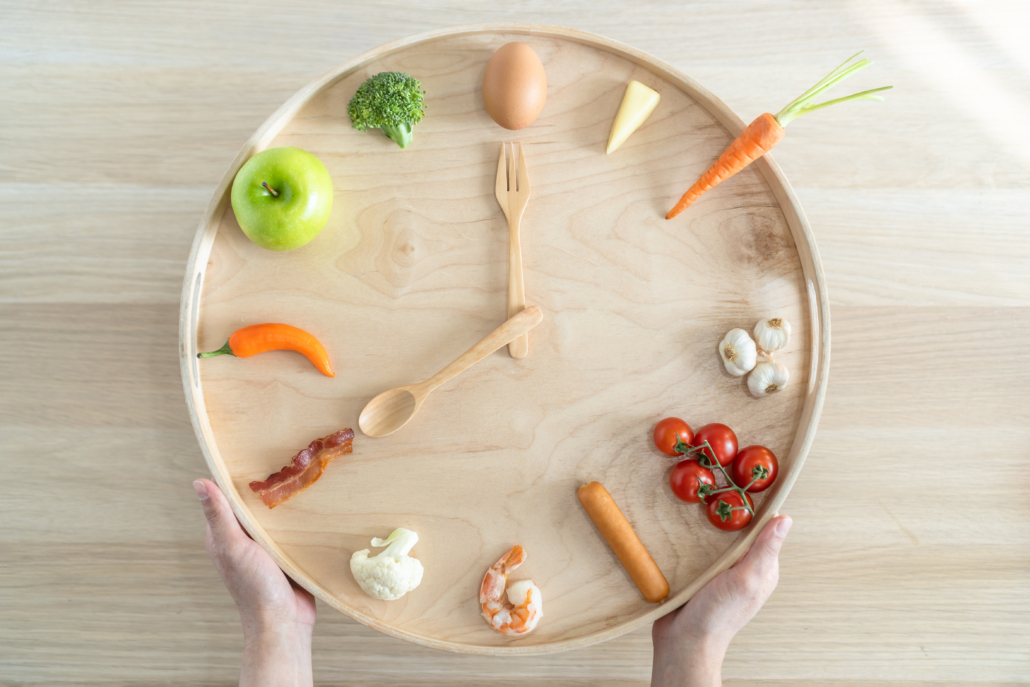CAN LATE NIGHT EATING LEAD TO WEIGHT GAIN? Long Island Dietitian Nutritionist Discusses Weight Loss, Health, and Eating Times.
Does meal timing matter? Would it be beneficial if you ate according to your internal clock? These questions can only be answered if you understand CHRONONUTRITION.
Chrononutrition is an emerging field of nutrition sciences that studies the connections between the biological rhythms inherent in our body and the effects on health and weight. Essentially, this is eating according to your circadian rhythm.
The Circadian timing system governs daily biological rhythms. Located in the brain, it is each individual’s body master clock. It is thought that this “master clock” is the pacemaker for the clock in every cell of the body. This biological 24-hour clock regulates how the food you eat is metabolized and used by the body. When the natural rhythm becomes disrupted, such as eating a meal late in the day, processes like insulin production and fat metabolism are likewise disrupted, leading to health consequences such as obesity, diabetes, and heart disease.
Growing evidence suggests that mealtime/energy distribution has a role in nutrient metabolism. More specifically, eating at inappropriate times may disrupt the circadian system organization, contributing to adverse metabolic consequences and chronic disease development. With over 30 years working as a registered dietitian and nutrition consultant, I have found that when my patients coordinate their meal timing with energy and hunger needs, essentially their circadian clock, weight loss increased, and health improved.
This recent evidence has shown that poor health and obesity are due to more than exclusively overeating and/or making poor food choices. People gain weight, struggle with weight loss, and are more susceptible to chronic disease when food timing is out-of-sync with their circadian rhythm.
Studies that support the recommendation to eat according to your internal clock found:
- When people ate their meals starting earlier in the day, they burned more fat than when they consumed their calories late in the day, especially in the evening.
- People who scheduled their meals to be consistent with their “biological clock experienced increased insulin sensitivity and cardiometabolic improvements.
- People who consumed more of their calories later in the day were more likely to be overweight and have higher levels of triglycerides, lower insulin sensitivity, and reduced blood sugar control.
Evidence from both animal and human research demonstrate adverse metabolic consequences of circadian disruptions. On the positive side, this growing body of evidence indicates that metabolic processes and metabolic heath can be optimized by aligning food intake with
Circadian rhythms. The following are recommendations to modify eating behaviors to achieve weight loss and promote health.
What To Do:
- Start your day with breakfast.
- Try eating more of your food in the earlier part of the day when you are more active.
- Eat within a 10-hour window.
- Have a meal routine that follows your body’s natural rhythm.
More reading:
- Time-restricted eating and exercise training improve HbA1c and body composition in women with overweight/obesity: A randomized controlled trial
Haganes, Kamilla L. et al. Cell Metabolism, Volume 34, Issue 10, 1457 – 1471.e4
- Late isocaloric eating increases hunger, decreases energy expenditure, and modifies metabolic pathways in adults with overweight and obesity
Vujović, Nina et al. Cell Metabolism, Volume 34, Issue 10, 1486 – 1498.e7
- Damien Lagarde, Lawrence Kazak, The timing of eating controls energy use, Science, 378, 6617, (251-252), (2022).
- Chrono-nutrition: From molecular and neuronal mechanisms to human epidemiology and timed feeding patterns Alan Flanagan, David A. Bechtold, Gerda K. Pot, Jonathan D. Johnston
- Kadey, Matthew, Environmental Nutrition, September 19, 2022
- Oike H, Oishi K, Kobori M. Nutrients, Clock Genes, and Chrononutrition. Curr Nutr Rep. 2014 Apr 27;3(3):204-212. doi: 10.1007/s13668-014-0082-6. PMID: 25101217; PMCID: PMC4118017.
- Henry, C.J., Kaur, B. & Quek, R.Y.C. Chrononutrition in the management of diabetes. Nutr. Diabetes 10, 6 (2020).




